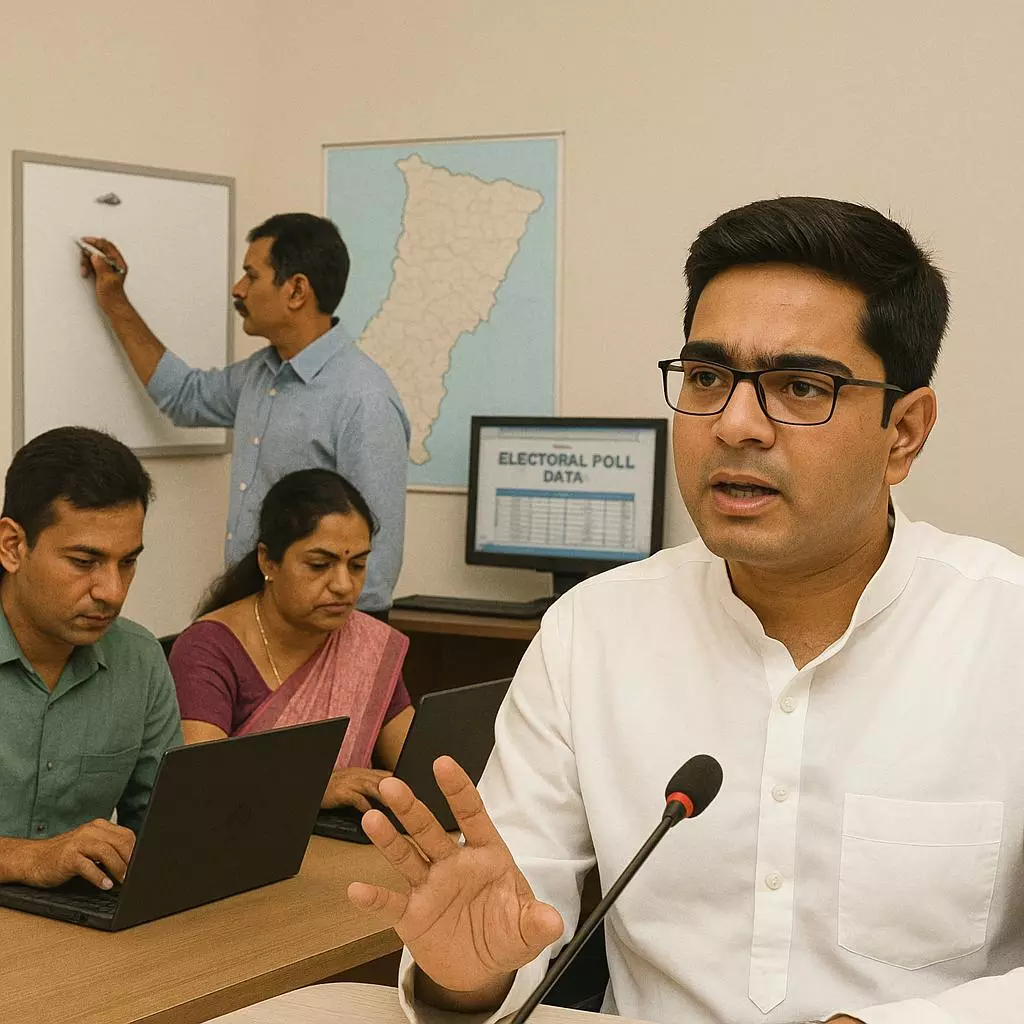
Representational AI image
Inside TMC’s SIR vigilance plan: War rooms, data teams, 24/7 ‘shadow agents’
Abhishek Banerjee leads a full-scale vigilance drive as Trinamool deploys booth-level agents and data teams to monitor the Election Commission’s voter list revision

From setting up war rooms to deploying booth-level 'shadow agents', the TMC is emerging as a full-time watchdog to ensure that 'not a single genuine voter is struck off' as the Election Commission begins the Special Intensive Revision (SIR) of electoral rolls across West Bengal.
The initiative was rolled out at a marathon virtual meeting of the Trinamool Congress (TMC) chaired by its national general secretary Abhishek Banerjee.
Nearly 18,000 leaders from the state, district, and block levels joined the session, which effectively became the party’s command briefing for what Banerjee described as an “acid test” for the organisation.
294 war rooms to be set up
The party decided to set up a network of 294 war rooms, one for each assembly constituency, designed to act as control centres for coordinating the SIR exercise in their respective constituencies.
Also Read: Why parties in Bengal and UP are revolting over SIR 2.0 | Capital Beat
These units will be supervised by local MLAs, while in constituencies where the TMC does not have legislators, block presidents will take charge.
Each war room will have 15 dedicated members, including ten coordinators tasked with maintaining direct contact with booth-level agents (BLA-2s) and five trained personnel for data entry and record-keeping, a TMC leader, emerging from the meeting, told The Federal.
The centres are to be equipped with laptops, reliable internet connections, and at least four to five “computer-literate” workers.
Booth-level 'operation' planned
For the next several months, the focus of the TMC campaign will be at the booth level, where Booth Level Officers (BLOs), appointed by the EC, will go door-to-door with enumeration forms starting from November 4.
Banerjee has instructed that each BLO be accompanied throughout the process by the party’s own BLA-2, creating, in effect, a system of man-marking where every official has a party counterpart observing and assisting the enumeration process.
In East Midnapore, the home district of BJP leader Suvendu Adhikari, a special legal cell will be formed to address disputes over voter deletions. Meanwhile, in Birbhum, Banerjee has asked local strongman Anubrata Mondal to coordinate efforts across factions.
The party will submit names of all BLA-2s in state’s over 80,000 booths to the commission by November 3.
These agents will work under the guidance of district-level BLA-1s, who will act as links between the local party organisation, election officials, and state leadership.
Two new posts created
Alongside them, two new organisational posts have been created, namely the Block Electoral Roll Supervisor (BERS) and the Panchayat Electoral Roll Supervisor (PERS), to oversee coordination in rural areas, while one person per ward will perform similar duties in municipalities.
Also Read: Why Tamil Nadu, Kerala are crying foul over SIR 2.0 | Talking Sense With Srini
“We must ensure that neither the BJP nor the commission can delete the name of any genuine voter,” Banerjee was quoted as saying by a participant in the meeting.
Over the next six months, all leaders and workers would be tested on their commitment and alertness, he reportedly told the party functionaries.
The TMC’s organisational response comes amid allegations that the electoral roll revision is being misused to exclude legitimate voters.
Party leaders Chandrima Bhattacharya and Kunal Ghosh had claimed on Friday (October 31) that there were glaring mismatches between the 2002 hard copy of the voter list and the digital version of the same published on the commission's website.
Round-the-clock surveillance of BLOs
Names were being selectively deleted under the pretext of SIR, they alleged, prompting Banerjee to oversee the exercise personally.
In practical terms, this means round-the-clock surveillance of BLOs’ activities. Each constituency will host assistance camps between 9am and 5pm, where party volunteers will help residents complete their enumeration forms.
Banerjee further directed that BLOs “must not be out of sight even for a minute,” and that the party’s agents should be present at every doorstep they visit. The operation’s intensity reflects a broader political strategy.
Having dominated rural Bengal in previous elections, the TMC now seeks to protect that advantage by guarding the electoral rolls.
“The BJP is trying to manipulate the voter list secretly by using the commission,” Banerjee told colleagues, describing the SIR drive as the frontline in a larger political battle.
District-specific orders have already gone out, party sources said.
Migrant workers to be brought back from other states
Leaders in minority-dominated Malda and Murshidabad districts have been told to ensure that migrant workers’ names remain on the rolls, even if that means bringing them back from other states to fill out forms.
In Jalpaiguri and Alipurduar, party workers have been instructed to extend their outreach beyond tea estates and visit every labour colony.
In East Midnapore, the home district of BJP leader Suvendu Adhikari, a special legal cell will be formed to address disputes over voter deletions. Meanwhile, in Birbhum, Banerjee has asked local strongman Anubrata Mondal to coordinate efforts across factions.
The TMC’s vigilance plan also extends to community outreach.
Hindu Matua community outreach too
Banerjee reportedly mentioned the anxiety among Hindu Matua communities, hinting that the party must address their fears and turn that sentiment into organisational strength.
While the party says it is ready for both “street protests and legal battles,” Banerjee has made it clear that the real fight lies in the paperwork by ensuring every genuine voter’s form is filled and all documents are verified.
To that end, the war rooms will serve as the nerve centres of communication, data management, and troubleshooting as the revision proceeds through thousands of booths across the state.
West Bengal’s around 3,500 gram panchayats and over 2,500 urban wards will thus see parallel camps, constant phone coordination, and day-long presence of TMC cadres shadowing the commission’s teams.

